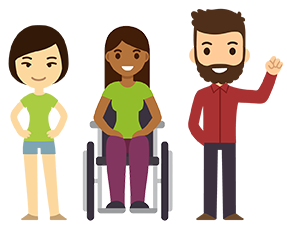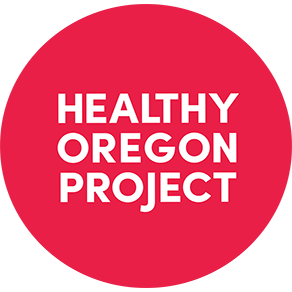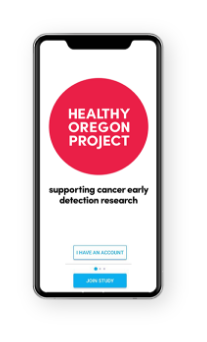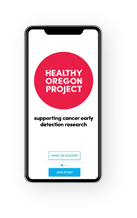The Healthy Oregon Project
includes many studies working together to empower participants, including cancer survivors, by providing personalized health information, such as their inherited genetic risk of cancer and other health assessments. With help from thousands of Oregonians, HOP scientists are learning more about early detection and treatments for cancer and chronic diseases all through your smartphone.
HOP Research Happening Now
Healthy Oregon Project Inherited Genetic Risk Screening
This study makes no cost DNA screening accessible to any Oregon adult, including cancer survivors, for many mutations that are known to dramatically increase cancer risk. Participants start by downloading the Healthy Oregon Project app, create a secure account, consent, then request a HOP Kit within the app. The HOP Kit is mailed to participant’s Oregon address with a prepaid return envelope included at no cost. An OHSU lab analyzes each saliva sample for variations in 32 genes associated with cancer and heart disease risk. All results are provided at no cost within six months.
Cancer survivors who have not had genetic testing are encouraged to participate in HOP’s inherited genetic risk screening regardless of treatment status. Survivors have an important role in cancer research and needed to fully understand the role of genetics and cancer risk.

Hop Surveys on the App
Surveys help us understand more about the role of environment, behavior, and lifestyle in cancer and other chronic disease risks. All surveys are available voluntarily to everyone who enrolls in the study, even those who choose not to participate in the inherited genetic screening. Check out examples of HOP survey subjects!
Behaviors
Examining the relationship between chronic disease risk and behaviors like smoking tobacco and drinking alcohol.
Cancer History
Helping researchers to understand past cancer diagnosis and known family history. We encourage cancer survivors to join HOP!
Colorectal History
Sharing personal and family history related to colorectal cancer and disease for overall knowledge.
COVID-19 & You
Understanding how the pandemic has affected cancer risk, prevention, and screening behaviors.
Lifestyle
Knowing more about your everyday lifestyle helps us have a fuller understanding of our participants and how health impacts their life. Here is the chance to tell us about you!
Stress
Understanding your experience with stress over the last month.
Measure Your Impulsivity
Having insight into what fuels decision-making behaviors can help understand how people accomplish tasks in life.
Test your Reaction Time
Testing your response time helps researchers understand the effects of participants sleep schedules on attention.
Collaborators
HOP is led by OHSU scientists and collaborators across Oregon at multiple organizations.














